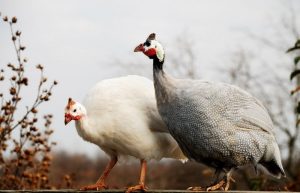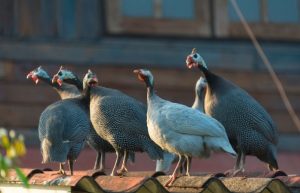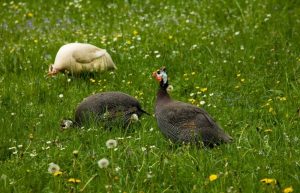
What’s the Average Lifespan of Guinea Fowl?
Guinea fowl can be useful poultry to have around your barnyard. They make great alert birds, letting out a loud squawk any time a predator or stranger appears. These birds can also help to control the pest populations on your property either by eating annoying bugs like ticks and mites or by attacking and playing with larger pests like snakes.
How long do guinea fowl live? Guinea fowl have an average lifespan of approximately 13 years. That being said, as free-range birds, guinea fowl often fall prey to predators and other unfortunate circumstances before meeting their average lifespan. You can take these steps to help increase your guinea fowl’s chances of living a longer life:
- teach your guinea fowl to go in a coop each night
- keep your guinea fowl in a covered pen
- provide access to a shelter for your free-ranging guinea fowl
- keep your guinea fowl in with geese
- take steps during the winter to protect your guinea fowl from the cold
Taking proper care of your guinea fowl can play a big factor in how long they live. Guinea fowl are hardy low-maintenance poultry that can often lead to their care and needs being overlooked. To learn more about the steps you can take to improve your guinea fowl’s chances of a long life, keep reading.
How to Increase Your Guinea Fowl’s Chances of Living Longer
Teach Your Guinea Fowl to Go In a Coop Each Night
Unlike other common barnyard poultry like chickens, geese, and ducks, guinea fowl are less domesticated. They prefer to free-range and wander where they want compared to living in an enclosure. Without being trained, guinea fowl won’t naturally go into a coop each night; instead, they rather roost up high in trees and on top of barns and houses. While that may not sound like a bad thing, it does make them susceptible to birds of prey, like owls, eagles, and hawks.
Teaching your guinea fowl to go into a coop each night can give them a safe and secure place to rest and nest. They can also lay eggs in there that you can collect later. The easiest way to teach your guineas to go to a coop each night is by starting them in the coop as keets, or as young birds.
You can also keep the guinea fowl with chickens for a few weeks so they get into the routine of going into the coop each night. Guinea fowl feel more secure in a group and with other animals, so when they see chickens go into a coop, they will be more willing to do the same.
To learn more about keeping guinea fowl in a coop, check out my article Do Guinea Fowl Need a Coop? Essential Care Guide.
Keep Your Guinea Fowl in a Covered Pen
 If you let your guinea fowl free-range, it can be difficult to round them back up to go in the coop. Free-ranging also makes your guineas more of a target for predators. One alternative to free-ranging your guinea fowl is to keep them in a large covered pen. Guinea fowl can fly, so covering the pen will keep them from escaping.
If you let your guinea fowl free-range, it can be difficult to round them back up to go in the coop. Free-ranging also makes your guineas more of a target for predators. One alternative to free-ranging your guinea fowl is to keep them in a large covered pen. Guinea fowl can fly, so covering the pen will keep them from escaping.
Being in a smaller enclosed area can be stressful for guinea fowl, who naturally tend to wander. For this reason, it’s important that you try and make a guinea fowl pen as spacious and open as possible. Once again, if you raise guinea fowl from an early age to live in a pen, they will be more accepting of the enclosed area.
If you do keep your guinea fowl in some sort of pen, it’s a good idea to put chicken wire around the pen to keep the guinea fowl in and the predators out. You should also bury the wire at least 12 inches into the ground to keep out predators that may try to dig their way in. You’ll also want to make sure the cover for the pen is strong enough to hold predators that may try to climb over. I’ve seen a cat sitting ontop of the covered chicken pens just watching the chickens down below! The last thing you want is the predator to fall into the pen and be able to snatch your poultry.
Provide Access to a Shelter For Your Free-Ranging Guinea Fowl
If you don’t want to keep your guinea fowl in a pen and you rather let them free-range, you should provide them with some type of shelter. I’ve noticed that when it comes to guinea fowl, only the smart survive. What I mean by this is every time I’ve had guinea fowl, the guineas that roosted in the trees at night quickly became prey for the predators but the guinea fowl who roosted in the barn rafters always out-lived the others. Smart guinea fowl will naturally seek shelter to roost in for the night.
I’ve seen free-range guinea fowl roost in barns and equipment sheds, and some even decide to join the chickens in the chicken coop. By providing your guinea fowl with shelter, you can still let them enjoy the freedom of being ree-range.
Keep Your Guinea Fowl in With Geese
Guinea fowl are natural alert birds, meaning that any time they sense danger, they let out a loud siren-like squawk. While this can be enough to deter some predators, guinea fowl can often be caught off-guard. One thing you can do to help keep your guinea fowl safe from predators is by keeping them in with geese.
Geese are popular livestock and poultry guardians due to their aggressive behavior. We’ve all been chased by geese at one point or another, whether you got too close to some goslings or you were simply walking in the park. Geese will hiss and charge anything they see as a threat. This can be enough to frighten off some predators and keep your guinea fowl safe.
To learn more about livestock guardian animals, check out my article What Are the Best Livestock Guardian Animals?
Take Steps During the Winter to Protect Your Guinea Fowl From the Cold
Predators aren’t the only thing that can cause your guinea fowl an early demise; guinea fowl can suffer from the effects of cold weather, like hypothermia and frostbite. These conditions are usually caused by wet and cold environments and can affect your birds if they don’t have access to adequate shelter.
Adding extra-insulating bedding to your guineas’ shelter and making sure it has proper insulation and ventilation can provide a comfortable area for your guinea fowl to rest during cold days. During bad weather, the guinea fowl will be more apt to stay in a shelter and avoid going out in the elements. Be sure to provide access to fresh water and bird feed inside of the shelter so the guinea fowl can still get sustenance.
You’ll want to clean coops and shelters more regularly in the winter, as the birds may be inclined to stay in them for longer amounts of time. As you clean the coop or shelter, always check to see if there is any damage or areas where predators may be able to slip in. An unsecured coop can be a threat to your flock and enable predators to target your birds when they are at their most vulnerable.
Do I Need to Feed My Guinea Fowl?
 When it comes to caring for your guinea fowl and improving the longevity of their lives, you may be wondering if guinea fowl need any specific food or sustenance. As undomesticated birds, guinea fowl are great at finding food and sustenance for themselves. They eat bugs, worms, weeds, and vegetation; so, the biggest thing is ensuring that your guinea fowl have access to areas where they can browse and graze. You can also feed guinea fowl chicken scratch and commercial bird food.
When it comes to caring for your guinea fowl and improving the longevity of their lives, you may be wondering if guinea fowl need any specific food or sustenance. As undomesticated birds, guinea fowl are great at finding food and sustenance for themselves. They eat bugs, worms, weeds, and vegetation; so, the biggest thing is ensuring that your guinea fowl have access to areas where they can browse and graze. You can also feed guinea fowl chicken scratch and commercial bird food.
You should avoid feeding your guinea fowl commercial bird food unless they live in an enclosure that doesn’t provide grazing or browsing. The feed can help them get the proper fibers, sugars, and proteins they need to stay healthy that they would otherwise get from the food they find on their own.
When it comes to providing water for guineas, free-range guinea fowl are pretty good at finding water for themselves. They may drink out of a puddle, water trough, or any other body of water they find. Guinea fowl can also swim and float like ducks! With all that said, you should still put out fresh water for your guinea fowl that they can easily access, especially if they live in an enclosed pen.
Make Sure Your Guinea Fowl Have Vegetation to Eat
Vegetation is an important part of your guinea fowl’s diet; it helps the birds to have good digestion. If your guinea fowl don’t have grassy areas they can pick at, you should provide greens to your birds every day. You can give them packaged hay, like alfalfa or timothy grass, or you can throw weeds and leftovers into their enclosure.
There’s an on-going discussion in the bird-world about whether you need to provide your birds with grit when they have eaten vegetation. Grit is sand or gravel that birds eat that can apparently help to break down foods that the bird has already eaten. Many people provide grit to their birds while others don’t. Either way, you should research and decide whether you plan to use grit or not. If you do, you’ll want to provide it to your guinea birds when they have eaten vegetation.
Can a Guinea Fowl Live By Itself?
Guinea fowl naturally feel safer in a group. If you watch guinea fowl, they all stay close together and always travel in a group, compared to chickens who tend to wander away from each other. For this reason, it’s not wise to keep guinea fowl by themselves; it can cause them stress and anxiety, which can lead to other negative health issues.
Guinea fowl do better in a larger group; this means they can watch out and alert each other of danger. Getting at least 6-12 guinea fowl can provide a group mentality that provides the guineas with security.
Guinea fowl may also hang around with other livestock for safety and protection. We had a lone guinea fowl that had managed to survive longer than all the others. We would always find him grazing with the horses and sleeping in their run-in shed. The horse herd helped him to stay safe and feel protected from predators.
Can I Keep My Guinea Fowl With Chickens?
You can keep guinea fowl with chickens, whether you’re keeping them in the same enclosure or simply having the guineas come back to the coop each night. While these birds can co-exist, guinea fowl may pick up your chickens, especially if you have male guinea fowl in with roosters. If you notice this happening, it’s best to remove the guinea fowl from the flock of chickens.
Guinea fowl can also breed with chickens and create a hybrid bird. These offspring will usually be infertile. While this pairing is rare, it can happen. To avoid this, avoid having a male guinea fowl in with just chickens. Otherwise, guinea fowl and chickens can function quite well together.
Did you know that I don’t just write articles about poultry? I write educational articles about many different types of livestock. To read more about raising livestock and poultry, check out the articles below:
